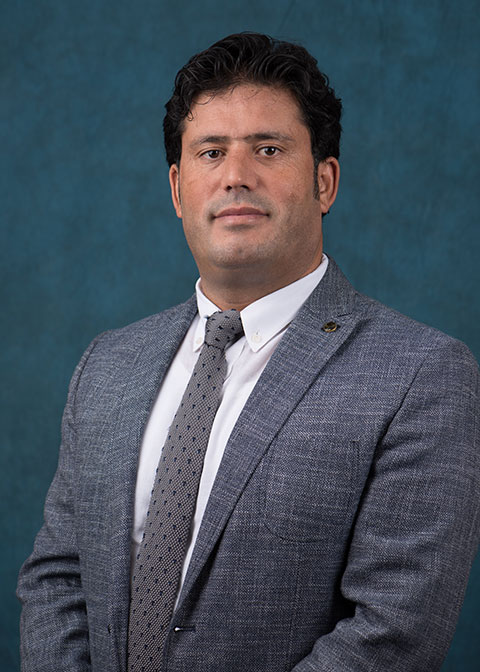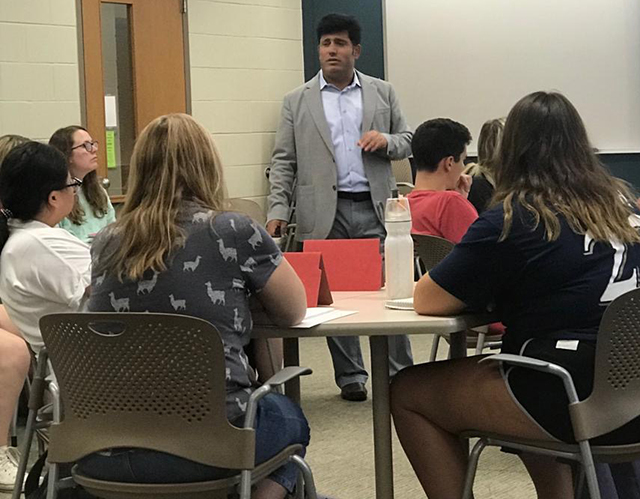How do you identify yourself? What is your racial identity? Your nationality? Religious affiliation? Cultural background? Who is included in your circle of your friends?
Dr. Hasan Aydin, associate professor of multicultural education in FGCU’s College of Education, starts his first class with new teacher candidates by asking these questions and reminding students that what the teacher is, is more important than what he or she teaches.
Often, the answers they give on that first day evolve based on what they learn about their heritage from parents, relatives, peers and their own research. What they ultimately end up learning is that they cannot be described by just one diversity characteristic. They actually do not belong to any one culture or country of origin. Their mindset is a product of their experiences.
For most of them, their cultural roots in Europe, Africa, Asia, the Americas or otherwise, provide a rich tapestry of culture that make them more multicultural than they had originally thought. Aydin is very passionate about reminding his students (and anybody else) to treat others well because we are all part of each other’s story. His own story illustrates why multicultural education is so important.
Aydin is proud to be of Kurdish origin, born and raised in Dogubeyazit City in Eastern Turkey, where the population is 99% Kurdish. There were no schools in this area. People of Kurdish heritage who wanted an education had to do three things: leave home, speak Turkish and hide their true identity.
Aydin wanted an education, so he and his twin brother went to a rural area that was 100% Turks. On the first day of school, the teacher told Aydin in Turkish to sit down. Since he did not understand the language, he remained standing up. The teacher smacked him and pushed him down. “That is how I learned how to say “sit down” in Turkish,” recalls Aydin. “From then on, I began to hide who I was so people would treat me fairly.”
He begged his parents to send him to a Turkish boarding school, promising he would come back and teach Kurdish children in their language. The

boarding school turned out even worse. Both teachers and students discriminated against him. Despite that, he still excelled in school. He was among the 10% of students who passed the national high-school qualifying exam and get to go to college. He was the only one of his 10 siblings to go beyond an elementary school education.
To escape the prejudices against Kurds, Aydin went to a college in Russia. Then he attended an ESL program in Mongolia and later was admitted to the University of Nevada in Reno. On completion, he fulfilled his promise: He returned to Turkey in 2011 to teach language and multicultural education in Kurdish.
By then, political attitudes toward Kurds had softened in Turkey and, as one of a few educated Kurds, he was able to collaborate with others to develop a bilingual education curriculum for learning in the Kurdish language that is still used today. Aydin’s dreams of continuing that legacy of advocacy were brought to a halt when a political coup happened in Turkey. Hasan had to leave in 2016 because he was targeted as a human rights advocate and could be jailed or killed. That’s when he immigrated to the United States. After a year teaching at Texas A&M, he came to FGCU in 2017.
In his classes, Aydin often reminds the students that, historically, the U.S. educational system has taught with a homogenous “melting pot” mindset, rather than an individualistic “salad bowl” approach. While the U.S. has become significantly more diverse over the past few generations, the teaching approach has remained the same.
Today, Florida is one of four states (along with California, Texas and New York) where more than half the students are minority-majority. In the Lee County School District, 54% of K-12 students are non-white, 134 languages are spoken, and 169 countries are represented. In the Immokalee region, over 90% of K-12 students are non-white. Meanwhile the teacher profile in both regions has remained constant — 83% are white females.
Aydin believes that, inevitably, teachers bring their backgrounds into the classroom. And their backgrounds include a melting pot approach taught from a white perspective. After all, that’s how most people have been taught in this country throughout our lifetimes. Outside of taking English as a Second Language classes, teachers are essentially doing the same things they’ve done for 50 years in terms of multicultural education.

This is a mindset that FGCU’s College of Education is changing, according to Aydin. First, there is an effort to diversify FGCU’s faculty composition. This diverse faculty is conducting research into different multicultural student perspectives and the readiness of teachers to instruct in culturally diverse environments. In a recent research project that Aydin conducted, it was found that the majority of teachers have never been fully prepared to teach multicultural students, and international students often feel left out of perspectives taught in class.
In an effort to “take the university to the community,” FGCU is also working with social studies teachers in Florida K-12 school districts to make their curriculums more culturally responsive to meet the needs of students and their families. Another approach the College of Education is taking is to examine the K-12 curriculum more carefully and identify the changes necessary to prepare teacher candidates to be more successful in providing instruction in diverse situations. Since most graduates of the College of Education stay in Southwest Florida to teach, FGCU is in a unique position to lead on this topic, both from a research aspect and from an educational perspective.
Aydin also prepares his teacher candidates to understand the significance of differentiating their instruction to meet the needs of their diverse students.
“Every student has a right to a high-quality education,” he observes. “As educators, it is our job to ensure that our students feel safe, accepted and respected in the classroom. Otherwise, they will not be successful. While in class, we need to be a role model for society in this regard. If you can change a student’s life, you can change society.”
Finally, awareness is key. Feeling safe and comfortable in a classroom is difficult when you’re on the outside looking in—when all the examples in your textbooks reflect someone else’s reality, when nobody knows or understands your story, and when everything from grades to social acceptance hinges on your fluent command of a language and an accent that is not your own. Students are left trying to shoehorn their square peg into a round hole, instead of the hole widening to include them. It is not just the multicultural students who benefit from inclusion. Everyone benefits from the broader, less insular, global perspectives these students bring.
Having authored many books on the subject, as an editor of multiple scholarly journals on the topic, and as a person who had to deny their own identity to receive an education, Aydin is one of a small handful of experts at FGCU’s College of Education who are helping to reshape the way teachers approach the growing diversity in their classrooms.
“Our differences are our richness,” says Aydin. “They help us understand each other, become responsible global citizens, and strengthen our democratic society.”
Despite the enormity of the transition they are spearheading, Aydin and his colleagues strive to remain optimistic about change. “We must live with hope rather than fear, preach love rather than hate and build more bridges than walls. We have to continue with this sacred effort and mission of providing moral leadership.”